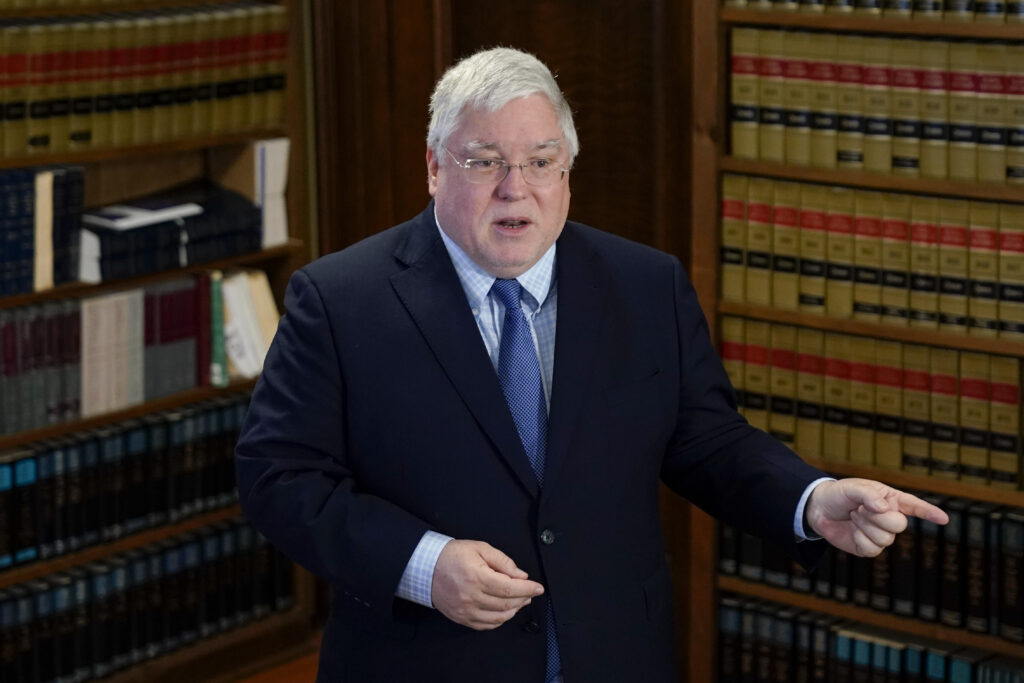A physician with decades of experience working in emergency rooms in the southern West Virginia coalfields was on Wednesday named the first board director of a nonprofit tasked with distributing much of the state’s over $1 billion in opioid settlement money.
Dr. Tony Kelly, an emergency physician with around 40 years of experience working in hospitals in historic coal mining communities like Beckley and Welch, will be the inaugural director of the 11-member West Virginia First Foundation board, according to unofficial results shared during a public meeting at the Raleigh County Courthouse in Beckley. Official results will be certified within a week.
The private foundation, recognized by the state Legislature and Gov. Jim Justice earlier this year, will distribute just under three-quarters of the settlement money won by the state in lawsuits against opioid manufacturers and distributors in West Virginia, home to the nation’s highest overdose death rate. Around a quarter will go directly to local communities and 3% will remain in trust.
All funds must be used to abate the opioid crisis, like evidence-based addiction treatment, recovery and prevention programs, or supporting law enforcement efforts to curtail distribution.
Kelly, who spoke at the meeting over zoom Wednesday, said “day in and day out” southern West Virginia emergency rooms are “ground zero” for the opioid crisis.
“We make more addicts every day than die,” he said. “And lots die every day. Whatever we’ve done in the past and what I’ve been involved with for the last 40 years has not worked well.”
Kelly said he’s looking forward to hearing about new ideas and strategies to curbing drug use: “There’s a whole generation that’s in jeopardy.”
Other nominees for southern West Virginia’s representative were Mercer County Commissioner Greg Puckett and Drema Hill, the vice president for community engagement and development at the West Virginia School of Osteopathic Medicine.
Representatives from 64 local governments in southern West Virginia had the opportunity to vote Wednesday for a director to represent them on the board. Four people made nominations at the meeting and were given three minutes to speak in support of their chosen candidate, and 40 total voted. Kelly was nominated twice.
Kelly was nominated by Raleigh County Day Report Center Director James Miller, who said Kelly’s name is “probably familiar to a lot of people” in the area because of his work in local hospitals, dating back to 1982 in Raleigh County and “just about everywhere else around here you can imagine.”
“I think he would be a wonderful advocate and ambassador for this area,” Miller said before the vote.
Over the past four years, drug manufacturers, distribution companies, pharmacies and other companies with roles in the opioid business have reached settlements totaling more than $50 billion with governments.
While the biggest amounts are in nationwide settlements, West Virginia — perhaps the state hardest hit by the prescription drug overdose crisis — has been aggressive in bringing its own lawsuits and reaching more than a dozen settlements.
In May, Attorney General Patrick Morrisey announced that the state had settled with Kroger for $68 million over its role in distributing highly addictive prescription painkillers in West Virginia. Walgreens settled in January for $83 million. Walmart and CVS settled with the state last September; Walmart agreed to a settlement of just over $65 million and CVS for $82.5 million.
Last August, Rite Aid settled for up to $30 million to resolve similar litigation.
Morrisey, who attended Wednesday’s vote, said the formation of the Foundation’s board and getting money out to communities is where “healing begins.”
The West Virginia Foundation will be headed by an executive director appointed by Morrisey and approved by its board of directors. A rapid search is underway now to select an executive director within the next month or two. The state has hired the search firm DRiWaterstone Human Capital, based in Arlington, Virginia, to help identify candidates.
Five members of the Foundation’s board of directors will be appointed by the governor and confirmed by the state Senate. Six board directors will be elected as Kelly was to represent six regions throughout the state.
The 11-member board must be in place by July 17, 60 days after the Foundation’s articles of incorporation were filed with the West Virginia Secretary of State’s office.
The meeting in Beckley Wednesday was the first of such meetings, which are scheduled to take place over the course of the next few weeks.
Local governments in the eastern panhandle will convene in Berkeley County, in central West Virginia’s Kanawha County and in northwestern West Virginia’s Wood County on July 12
Northern panhandle officials are meeting in Ohio County and northern West Virginia officials are meeting in Monongalia County on July 13.






















